Is anyone winning the Middle East war?
The ongoing war in the Middle East leaves no true winners. It weakens the UN, damages America’s global reputation and threatens Israel’s future. The greatest suffering is borne by innocent Palestinian and Lebanese civilians. Lianhe Zaobao associate editor Peter Ong discusses the situation.
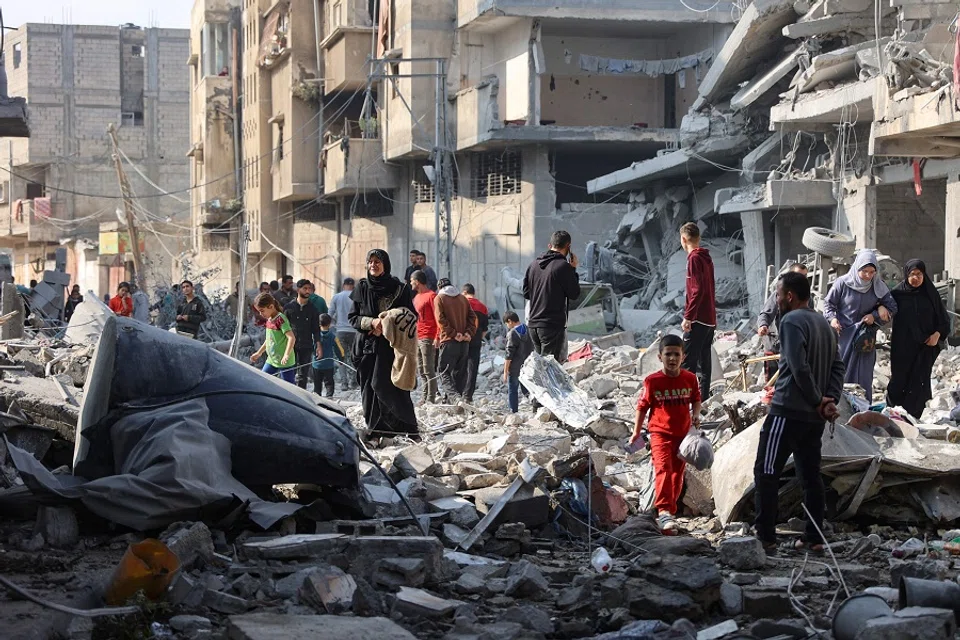
I rarely watch a United Nations General Assembly (UNGA) session live, but I did so on a whim in September. My curiosity was piqued by Israeli Prime Minister Benjamin Netanyahu’s scheduled speech and the question of how many attendees would be willing to listen to him.
Perhaps unsurprisingly, as soon as the UNGA president announced Netanyahu’s name, many leaders and delegates left the assembly hall in unison. This reaction occurred despite his significant influence and power in the Middle East, where he holds the lives of millions in his hands. Even those who despise him — shouldn’t they have at least heard him out?
Nevertheless, their decision to boycott the session underscores that people have long ceased to harbour any illusions about him, and reflects the helplessness and despair many feel about the crisis in the Middle East. The only way leaders and delegates could express these sentiments was through the small but defiant act of walking out.
A nearly empty room
Delivering his speech to a nearly empty auditorium, Netanyahu began by saying that he had not originally intended to come. However, he felt compelled to defend Israel’s reputation in the face of global condemnation. But ultimately, his attempt to “set the record straight” only amplified the lies and slander, now with a distinctly Israeli slant.
While those addressing the UN are undoubtedly skilled orators, masters of rhetoric and elevated language, their logic and moral compass seem to have deteriorated to the level of a fish market brawl. Just days before Netanyahu’s speech, the Libyan delegate called Israeli delegate Danny Danon a clown, in response to Danon comparing the UNGA to a circus.
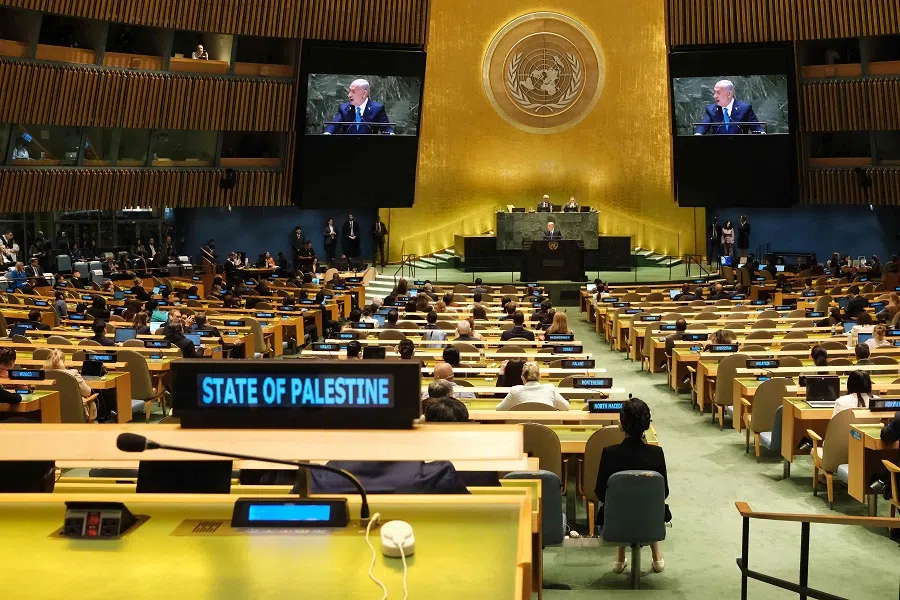
Despite the sparse audience, Netanyahu, a seasoned orator, delivered his speech with compelling confidence, perhaps bolstered by his history in New York, where he served as Israel’s UN ambassador decades earlier.
The following day, a foreign news report said that Netanyahu’s speech was met with “applause” and that “some delegates, including the Iranians, walked out”. This was misleading. It wasn’t merely “some delegates” who left, but a mass exodus that left the hall roughly 90% empty.
And while applause did occur, it emanated not from the delegates on the floor, but from the balcony, where Israeli supporters, including families of hostages, were present. The delegates themselves, save for a handful of Israeli diplomats, remained pointedly silent. The Western reporter’s presentation of a staged scene as genuine, resulting in a characteristically misleading report, raises serious questions about their objectivity.
The speech
A notable feature of Netanyahu’s speech was his presentation of two maps, one of which depicted “the blessing” while the other depicted “the curse”. The map of the “blessing” portrayed his vision of a land bridge across the Arabian Peninsula, connecting the Indian Ocean and the Mediterranean Sea, with participating countries coloured green on the map. Along this bridge, railways, oil pipelines and fibre optic cables could be laid for collective development and co-prosperity.
The other map depicted the “arc of terror”, in which Iran, Iraq, Yemen and Syria were coloured in black. Netanyahu went on to accuse Iran of internal repression, external aggression, funding terrorism, and of putting the people of the Middle East in a desperate situation. He then declared that “there is no place” in Iran and the Middle East “that the long arm of Israel cannot reach”. Rather ironically, the camera panned to the now empty seats that had been reserved for the Iranian and Saudi Arabian delegates just as he was issuing these threats.
... it feels like all that remains of the esteemed institution that is the UN and the values it stands for — including its dignity and sense of justice — are merely nominal, and that its status and legitimacy are diminishing.
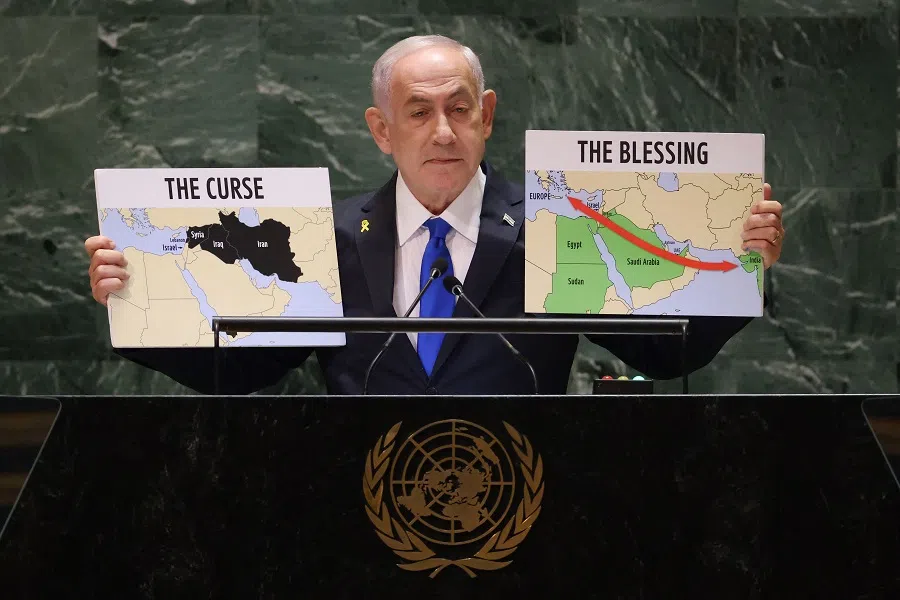
Even on my small computer screen, I noticed that the two maps depicted Israel as a single piece of territory, with no indication of West Bank or Gaza. The conspicuous absence of these two territories speaks to the fact that Israel does not support the two-state solution, a stance that it has long adopted.
I did not know then, but before his speech Netanyahu had already given the order to bomb Beirut and eliminate Hezbollah leader Hassan Nasrallah. Unbeknownst to the delegates who had walked out and the remaining audience in the UNGA hall, a bloodbath had already started thousands of miles away. In retrospect, the threats made by Netanyahu at the UNGA had been very real indeed.
The institution of the UN: standing but undermined
After listening to the speech, it feels like all that remains of the esteemed institution that is the UN and the values it stands for — including its dignity and sense of justice — are merely nominal, and that its status and legitimacy are diminishing.
From repeated strikes on UN refugee camps that have killed over 200 UN agency staff members and hindered humanitarian aid, to recent attacks on peacekeepers stationed in southern Lebanon, it is clear to the Netanyahu administration that the UN can be disregarded and defied. For example, Israel has declared secretary-general António Guterres persona non grata, banning him from entering Israel. Such open defiance is rare — this is only the second time that a UN secretary-general has been banned from a country.
Why hasn’t the UN been able to get Israel to adhere to generally accepted principles or the collective consensus? The main reason is that Israel stands under the aegis of the US, one of the world’s greatest powers and one of the five permanent members of the UN Security Council (UNSC). Although UN resolutions and actions can still play important roles, the efficacy of such resolutions is significantly limited when they impinge on the core interests of the Big Five.
At the end of the day, I cannot help but dwell on the sobering thought that the future of the UN will be bleak if it fails to push reforms forward and regain a sense of legitimacy.
As a certain commentator once candidly pointed out, America’s neck is in Israel’s clutches, and Israel is the “little permanent seat-holder apart from the Big Five”, to the extent of being a de facto permanent member of the UNSC. This partly explains why there is always fighting in the Middle East, why it is so hard to end the strife.
Similarly, the reason why the Russia-Ukraine war has been dragging on for so long has very much to do with Russia being a member of the Big Five. Left with no alternative, they resort to the battlefield, where planes, tanks and cannons speak the only language understood. At the end of the day, I cannot help but dwell on the sobering thought that the future of the UN will be bleak if it fails to push reforms forward and regain a sense of legitimacy.
From the looks of it, Israel’s retaliation has been successful — it has consistently dominated the conflict, even as it fights on multiple fronts. Over the last five wars in the Middle East, Israel has always gained territory, growing in land area from an initial 10,000 to 28,000 square kilometres today. The streak of territory acquisition will probably continue this time. Gaza has been utterly devastated, but Egypt’s sealed border and the two million Palestinians within prevent its outright annexation. Instead, it faces a slow, piecemeal erosion.
In time to come, I believe that Israel will pick out better lots for settlement development, in addition to designating zones of military control and implementing a segregation policy to make new residents feel safe. If this sounds familiar, it is because it bears many similarities to the West Bank model. Except, of course, Gaza will be worse off this time because the blockade will leave them in a more desolate, overpopulated environment with fewer resources. Most residents will eventually be forced to choose between living in refugee camps and ruins.
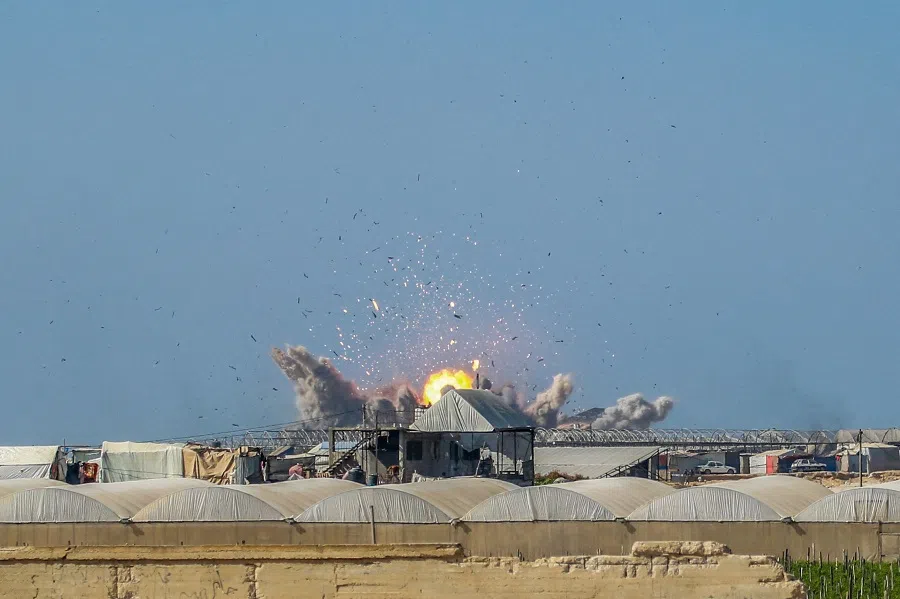
Southern Lebanon, larger in area and more bountiful than Gaza, is likely to suffer the same fate. Israel has reportedly come up with a plan that would require Lebanon to allow its southern neighbour to carry out “proactive law enforcement” in Lebanese territory, giving Israel free access to its airspace.
In other words, Israel wants to demarcate a zone that would provide an effective buffer against the presence of Hezbollah’s militants. Such an act would also enable Israel to relocate some of its people to southern Lebanon, just as it did with Syria’s Golan Heights. Given enough time, illegal appropriation could become a fait accompli.
The Palestinians and Lebanese lack bargaining power and have effectively been rendered helpless in the face of Israel’s brazen behaviour. The international community will undoubtedly condemn Israel’s actions, but — as we know by now — verbal condemnations mean nothing to Israel.
There is a more pressing crisis that Israel must now face: the rapid deterioration of their reputation.
No friends, no limits
Israel might have won the war, but it may very well be the ultimate loser in the long run from the standpoint of its own geopolitical stability. It has sown the seeds of resentment and hatred — both powerful driving forces — in the places it has ravaged, and a collective desire for revenge may come back to bite Israel in the future. The burgeoning fertility rate in the affected regions also means that it is likely these regions will become a force to reckoned with, in terms of sheer numbers. To put things in perspective, Israel only has a population of around ten million, which is vastly outnumbered by the 470 million people who live in the Arab world.
But perhaps the future is too far away. There is a more pressing crisis that Israel must now face: the rapid deterioration of their reputation. It’s a pity that Israel has made an enemy of itself on the public stage, given its many strengths. Israel possesses immense technological prowess and wealth, for instance, and its people are talented and resilient. And yet because the Netanyahu administration has shown continued disdain for diplomatic resolution and a callous indifference towards the oppression of innocent people, their international reputation has gone down the drain.
In the past, hostility to Israel came mostly from Muslims. Today, however, resistance to Israel has expanded to include almost the entire Global South. Even in the West, scathing condemnations of Israeli violence and foreign policy are increasingly widespread, especially among young people. The collective boycott of Netanyahu as described at the beginning of this essay is but the latest example of resistance to Israel’s actions and policies. There must be a chilling sense of loneliness in knowing that a significant portion of the world has turned its back on you. Israel only has one remaining ally in the US, but even then US sincerity is questionable.
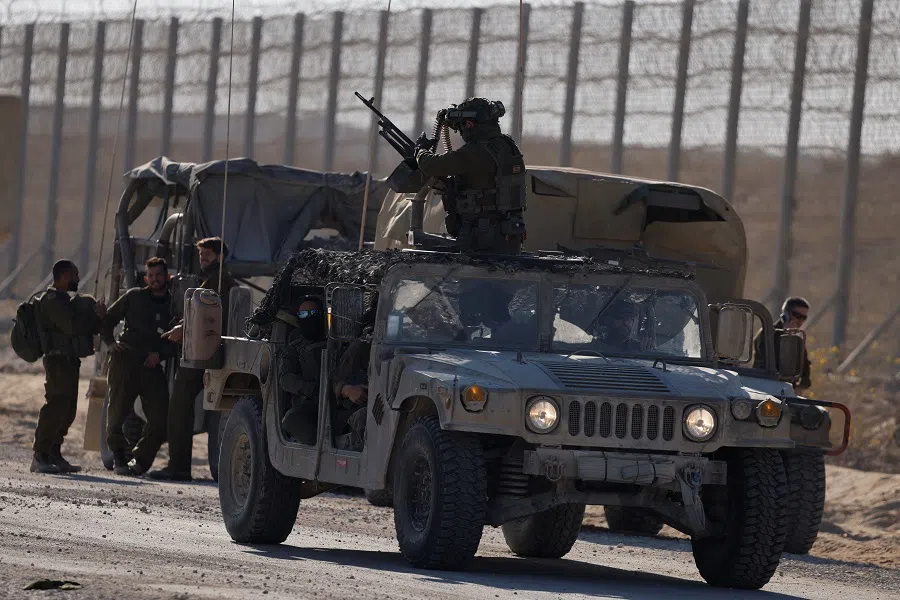
How have things gone so far? Last month, when news emerged that pagers meant for Hezbollah simultaneously exploded in the faces of people holding them, a colleague of mine remarked in surprise: “Isn’t this whole operation too painstaking and high-tech?”
“No,” I replied, “it can be done, as long as there is no bottom line.”
Indeed, the nature of the various atrocities and genocidal acts Israel has committed so far – such as attacks on hospitals, schools, refugee camps and relief convoys; the dropping of 2,000-pound bombs on residential areas; along with the implementation of a “starvation campaign” against innocent civilians — are so cruel that the perpetrators must lack a conscience and a heart. This lack of a bottom line is, I believe, the reason for global disgust with Israel. But why is Israel doing this?
In the US, brute power has replaced morality, making it painfully clear to observers that the superpower’s reputation and moral standing has sunk to a new low.
America as an accomplice: losing status
In the big picture of this whole game, another party is also experiencing greater losses than gains. I am, of course, referring to the US.
Israel is America’s biggest handle on Middle Eastern geopolitics, so to speak. Given that several members of the American Jewish community play pivotal roles in US domestic politics and foreign policy, the superpower tends to lean in favour of Israel.
Since World War II, Israel has received the greatest amount of foreign aid cumulatively from the US. Furthermore, the overwhelming majority of instances in which the US exercised their veto powers at the UN were in support of Israel. The US has also been supplying weapons to Israel since the start of the ongoing war last October. Take, for example, the aforementioned 2,000-pound bombs. According to a Reuters report in June, at least 14,000 of these destructive bombs have been sent to Israel. Without US military aid, Israel would not have been able to fight such a prolonged war of attrition.
Because of its complicity in the ongoing conflict, it can be said that the US is eschewing its commitment to uphold the rule-based international system. It has, for that matter, long ceased to put up a moral front for a while now. The fact that international politics runs on realism remains unchanged. In the US, brute power has replaced morality, making it painfully clear to observers that the superpower’s reputation and moral standing has sunk to a new low.

In the domestic arena, Joe Biden, who was forced to drop out of the presidential race, has also taken damage. If he did not back Israel, he would run afoul of influential figures in the Jewish community, some of whom play pivotal roles in the American financial ecosystem. If he did choose to support Israel, he had to worry about how he might lose the votes of young people, as well as Muslims and those of Middle Eastern descent.
On top of that, Biden is perceived to be incompetent and has been bluntly criticised for being hypocritical because of his failure to restrain Netanyahu. His foot-dragging also caused collateral damage to Kamala Harris, who had been in her final push for the presidency but ultimately lost the election.
The war has rendered the UN ineffectual, eroded America’s international standing and reputation, and could potentially cause severe issues for Israel in the future.
Some feel that Netanyahu’s actions indirectly gave Donald Trump an edge over Harris, given that the former president (now president-elect) is more pro-Israel. In any case, there is no turning back for the US. If the US is not careful, the worst-case scenario — being dragged into a direct war with Iran — could happen. After all, Israel has a very clear strategic goal, which is to strike Iran — the major thorn in its side — before Iran gets possession of nuclear weapons. As the window to strike first closes, the urgency of the situation increases for Israel.
In short, there are no true winners in the ongoing war. The war has rendered the UN ineffectual, eroded America’s international standing and reputation, and could potentially cause severe issues for Israel in the future. Ultimately, it is very possible that all participants will lose out in one way or another.
Needless to say, no one suffers more in this situation than the countless Palestinian and Lebanese civilians who live in fear and uncertainty every day. They did not choose to be part of the war, but they continue to pay the highest price for it with their lives, blood and tears.
This article was first published in Lianhe Zaobao as “一场几乎没有赢家的战争,值得吗?”.





